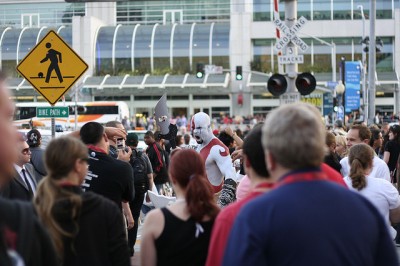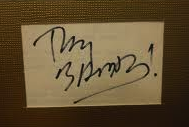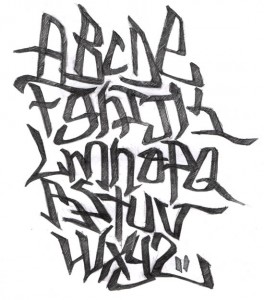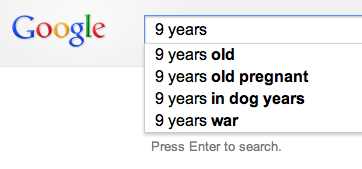I’m back from the San Diego Comic-Con, and against all odds, I had a great time! I say “against all odds” kind of jokingly because the show can be extraordinarily wearing — for the attendees no less than for the exhibitors. Yet I got to meet lots of fun people, hung out with friends, did a bunch of cool sketches, and came home jazzed and inspired!
I’ve also been trying to sort out my feelings about Comic-Con as an entity. It’s big and loud and exhausting and expensive to participate in, but at the same time it’s this amazing passel of energy that assembles, charges itself up like a lightning storm, and then disassembles in the space of a week, leaving no trace. It’s like Burning Man in that way, except where Burning Man isn’t concerned with commerce, Comic-Con is exquisitely concerned with commerce. And it’s one of these things in life that’s now so big that it can only be appreciated in facets.
To that end I’ve been pleased to share some thoughts on the convention with friends and colleagues over the last few days. First, my fellow cartoonist Jeph Jacques wrote a bit here on a very real problem with Comic-Con, that it’s becoming completely inaccessible to the casual fan:
Part of the problem is that SDCC has run out of room. They can’t add any more booth space, and they can’t sell any more tickets than they already do. This means that the convention is a zero-sum game now — there is a set number of people who can attend, and a set number of people/companies/etc who can exhibit. Tickets for the convention sell out incredibly fast, which means that they’re mostly snapped up by the die-hard Comic Con fans who stay up all night hitting “refresh” in order to buy tickets. You can’t just casually decide to go check out the convention anymore — you have to commit to it months and months in advance.
In addition to the limited number of new people who can attend, every year there’s more to do outside of Comic-Con itself. It’s become something like a fair, full of attractions in neighboring parking lots and hotels. So the people who do come to the con don’t spend as much time on the floor. More fun for them, but it makes business tougher for the exhibitors who’ve paid a premium to get inside.
Still, I wrote a piece myself (in reaction to Jeph’s) about another advantage the Con still has:
Pro badges are non-ticketed badges supplied to industry professionals. Comic-Con’s definition of “industry professional” has been narrowing over the years as crowding becomes more and more of an issue, but it is still possible for a comic creator or (certain type of) film or gaming professional to get into the show without buying a ticket. That represents the ongoing role that Comic-Con plays in the life of a creator in terms of networking. My career is made from bits and pieces of all kinds of different projects, and Comic-Con contains a ton of people who can enable, encourage, patronize or collaborate on those projects.
In response to which Ryan North weighed in:
DC and Marvel’s monthly comic print sales are not what they used to be, and Hollywood licensing has filled that gap for a long time. But popular tastes aren’t going to be for superhero movies forever, and this current boom in superhero movies that started with X-Men in 2000 has to end sometime. Maybe that means in a few years Comic-Con shrinks a little, and with extra room, the casual comics fan can stop by on Saturday and check things out by buying a ticket at the door and without having to get a hotel in the city months and months in advance. That’d be nice!
After reading Ryan’s piece, I read some of Tom Spurgeon’s thoughts about the Con. Tom wrote an extensive series of recaps each day, a monumental feat I laud him for, and related tons of meetings with comics pros, and deals and announcements being struck and announced, and art being discussed and debated and purchased… and in a weird way, the whole thing made me feel a bit small, just a little tiny footnote in one little tiny corner of the giant convention hall, doing my doodles and selling my stickers while Real Comics Business was being conducted elsewhere.
But then I realized that that’s the point of Comic-Con, that while there are certainly celebrities and superstars and veterans looming about, the place is bigger than even them, and that even the people for whom comics itself is a giant afterthought can come to this strange event, this massive amusement park that’s only open five days a year, and it’s a thing they can enjoy exactly as much as anyone else.
This crystallized when I spoke to a few of my non-comics-industry friends who’d also made it down to the show, and I wrote up some more thoughts here:
I think the Renaissance Faire comparison is most apt. You don’t attend a Ren Faire necessarily with the aim of buying an ocarina or some kind of blown glass artifact; you go to see people in costume, watch a joust, and eat a turkey leg. You go for the spectacle and the experience, and you usually go with an open mind. I think that’s how lots of people attend SDCC — just to see what’s there to see. It’s an amusement park.
And that’s something smaller creators like myself sometimes forget, because for us it’s very specifically a business…
I can sometimes feel very jaded about conventions, especially when the logistics are complicated or the revenues aren’t what I hoped for, but I have to remind myself that these events were created and labored over for the express purpose of human connection, and that’s a worthy goal unto itself. Anyway, I’m happy to have had the opportunity to think about the whole experience from a new angle, and I hope you click through to read our thoughts at greater length!
As a final note, I should add that there do remain many problems with Comic-Con as it exists now, the biggest being what Jeph outlined; that is, how difficult it is to attend for the casual fan. Not only is it expensive, but the tickets sell out so quickly, and if you don’t have an industry connection that can bring you in on a different type of badge, you may be aced out.
Luckily I have a solution: the Emerald City Comicon. Held in Seattle every March, ECCC isn’t as huge as Comic-Con, but it still has a great mix of comics pros, folks in costumes, celebrity panels, and games and events. Plus, it’s in beautiful Seattle! And I am willing to wager that even if you live in Southern California, the cost of travel to + lodging in Seattle will be cheaper than the cost of travel to + lodging in San Diego. Come check it out next spring, it’s one of my favorite cons!
Finally — I enjoyed getting the perspective of my friends about Comic-Con, but what about you? Have you been to any cons, and if so, what did you enjoy? What made you decide to go, and how did you like it once you got there? Or if you haven’t been, what kind of event would you go to? Leave a comment on this post, I’d love to hear your thoughts!
BONUS LINK: If you’re new to Wondermark, you may not have seen my video from a few years ago, “Me Vs. Comic-Con: Who’s Better?” I recommend CHECKING IT OUT THOROUGHLY







